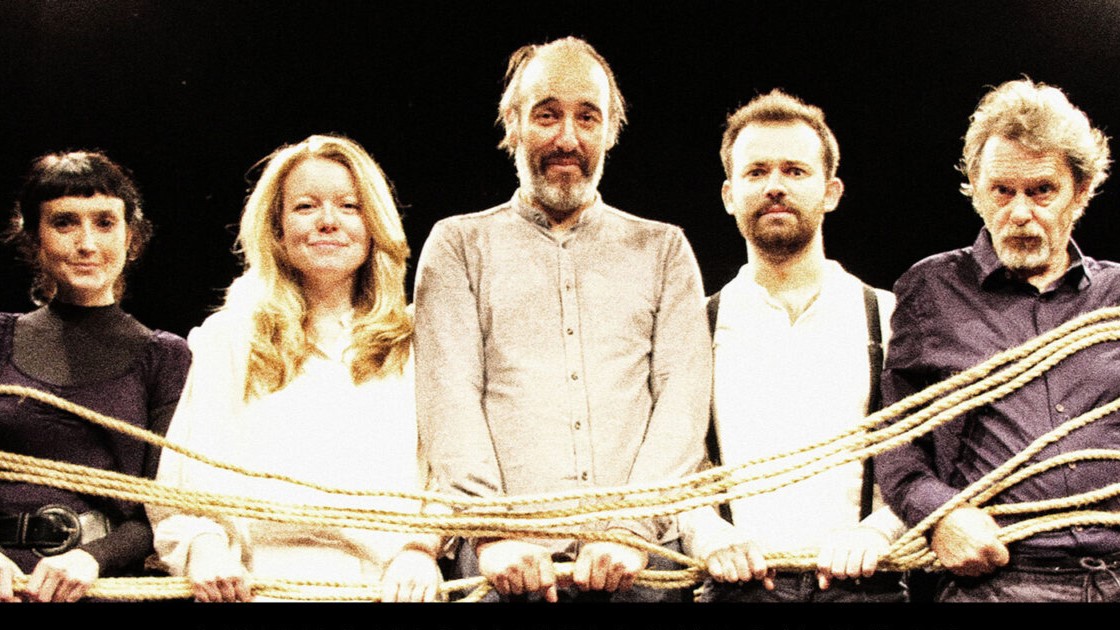PROVO — In his book The Director’s Vision, indicates that for something to be theatre, it must have actors, a stage, and an audience. The minimalist production of William Shakespeare’s Romeo and Juliet by the British touring group Actors from the London Stage did not demand much more than those simple elements. What five actors were able to do with this timeless text and a few simple props and costume pieces was a masterclass in acting technique and precision directing and choreography. Directed by the five actors in the cast, this show did not waste a movement or a moment on stage, and the result is in incredible staging throughout the show and phenomenal performances from professionals at the top of their craft.

The show’s technical elements were simple. Two sets of four simple chairs sat in diagonal rows upstage right and left. There were a number of collapsible fabric boxes that the actors used to change simple costume pieces to indicate the several characters they each played. Additionally, there was a red cloth that would serve as a variety of symbolic props through the production, including swords, poison, the Capulet tombs, and cairns that set an off-stage border in the playing space and indicated the bodies of fallen characters in through the show. The Capulets were signified by blue socks, scarves and other clothing pieces, while the Montagues were given yellow tokens. There were no microphones, little in the way of light changes, and music was live from the actors playing mandolin, guitar and percussive instruments. Without the chairs, the show’s entire technical demands likely fit in a couple of suitcases. Yet, how those items were used in the rapid fire and emotionally expansive production was phenomenal.
Thomas Wingfield played Gregory and Lady Montague at times, but spent most of the production as Romeo. On stage he exuded the charisma of a young Brandon Flowers (lead singer of the Killers). Wingfield was incredibly present in each moment. His fierce anger was seared out of his eyes in killing Tybalt and immediately returned to shock and remorse. Wingfield was gentle in his romantic encounters while being roguish and playful as he broke the fourth wall during the balcony scene. In a production with five supremely trained actors, his Romeo was a standout and a truly sympathetic character because Wingfield highlights Romeo’s virtues and makes his eventual tragic death all the more painful.
Hilary Maclean played six characters, but was particularly memorably as a fierce but fair prince and as Juliet’s nurse. Often the nurse can be over dramatized and clownish, but Maclean’s interpretation was realistic and human. Through Maclean, the nurse’s objectives were clear in each scene. (I had never understood how terribly the death of Tybalt affected the nurse until watching Maclean tonight.) Each character who interacted with the nurse seemed to have a deep understanding of who she was and a palpable chemistry with her. Maclean demonstrated incredible dynamic range playing serious and silly moments as she gently brushed upon some of Shakespeare’s wittiest innuendos in a way that played well to the BYU audience.
Several characters whom I have often seen reduced to shallow caricatures were all given new depth in Jonathan Oldfield’s performance. In one scene he would play Lady Capulet — not as a foppish impersonation of an older woman, but as a tender mother who moved and spoke with care. In another scene, he was a vicious and unbridled Tybalt who was a credible threat to Romeo in their duel. Still yet, Oldfield found a wise and devoted Friar Lawrence who was nonetheless comedic in the scene in which Romeo confesses he is no longer in love with Rosaline. The program’s description of Oldfield’s training at Bristol Old Vic in commedia dell’arte was a major “ah-ha!” for me; that training explains how he brought consistent and distinct physicality to each character he played. Oldfield was a delight to watch, and he breathed vibrant life into otherwise forgettable characters such as Peter, the Capulet’s servant.
Kaffe Keating had the least stage time, but he filled each moment he had playing Mercutio and Capulet as well as providing live music. His drunken stagger when Romeo had evaded him was so even and sincere. Again, like his peers, none of this play (which almost begs to be overacted) was difficult to watch. Keating’s Mercutio initially laughs off his fatal wound, but grows quickly more faint until he dies a harrowing death.
Finally, Grace Andrews played three vastly different characters in Benvolio, the Apothecary, and Juliet. In the first act, I did not always connect with the portrayal of Juliet because I did not fully understand her motivations, and her love seemed to lack energy next to the gravity of Wingfield’s Romeo. The subtlety that served her castmates so well seemed to dampen Juliet. After intermission, however, Andrews tapped into the anguish and forced compliance of Juliet after Romeo’s banishment. During Tybalt’s funeral when Juliet’s father is making arrangements for Paris to marry Juliet, Andrews played Juliet in a romantic and still embrace with Wingfield’s Romeo. When the focus shifted back to the lovers, their physical back-and-forth and banter about birds was heart-melting. The darker aspects of the plays later scenes were a marked strength for Andrews, and I found myself enthralled with her return from death and eventual stabbing. It was wrenching to see her character’s full development end in such woe.
Ultimately, this touring production of Romeo and Juliet was an incredible experience to watch. The actors broke the fourth wall often in the play’s first half with light and airy scenes that played well to the more comedic characters. And when when the definite mood shift after intermission, and I found myself in rapt silence to the play’s end. This production is part of the “Bravo!” series at BYU. Bravo, indeed!
[box]The Actors From the London Stage touring production of Romeo and Juliet plays nightly at 7:30 PM through January 28 and 2 PM on January 28 at the West Campus Mainstage Theatre in the West Campus Building (1125 North University Avenue, Provo). Tickets are $18-26. For more information, visit arts.byu.edu.[/box]
